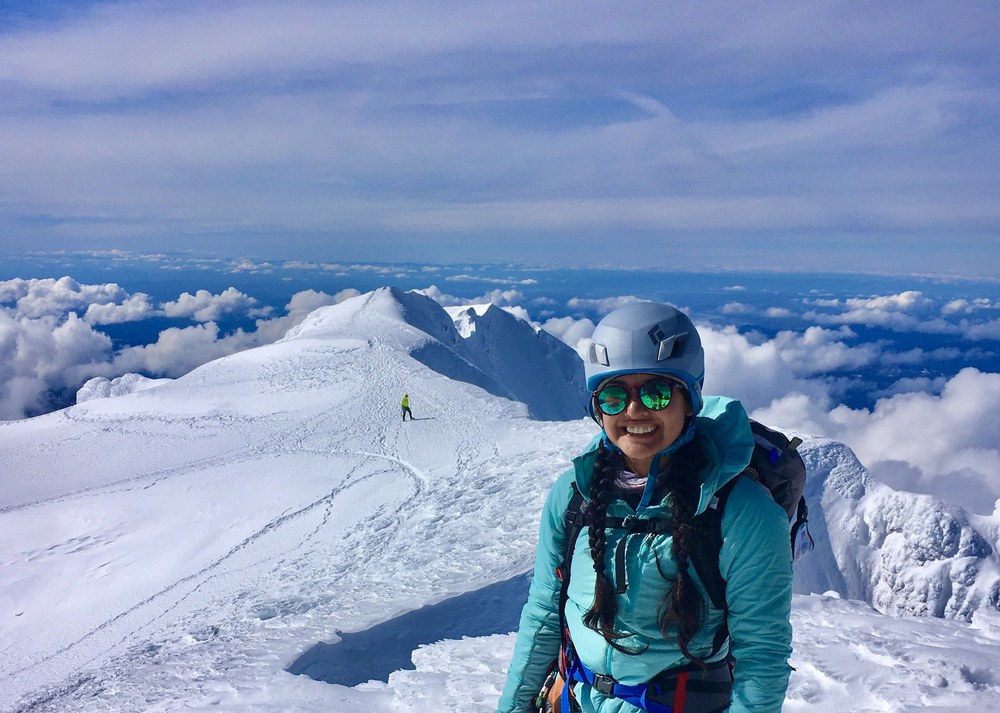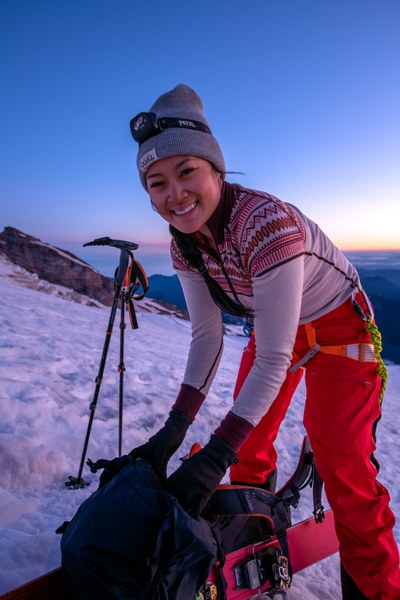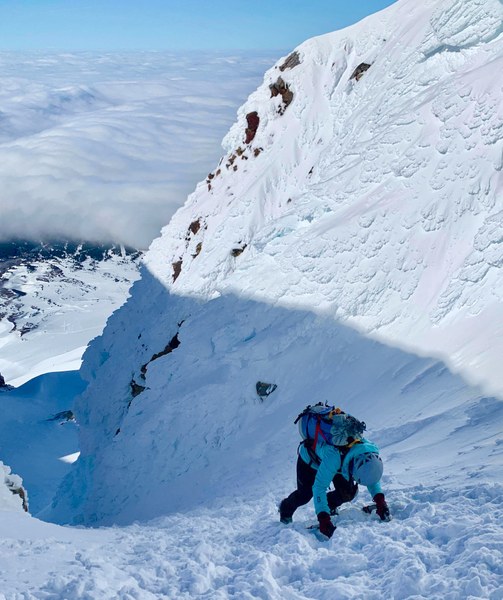
Theresa Silveyra and Amber Chang are both accomplished climbers and mountaineers. They recently teamed up for Theresa’s #30Before30 project: an ambitious plan for Teresa to climb Wy’east (Mt. Hood) 30 times before Theresa turned 30. Amber joined Teresa for a celebratory summit number 31!
Theresa’s plan included fundraising for Climbers of Color, Outdoor Afro, and Decolonizing the Music Room. To highlight Theresa’s project, Amber started a Q&A session on Instagram during their climb to discuss how they, who both identify as women of color (WOC), found themselves in white, male-dominated outdoor spaces, and what they are doing to change the narrative about who belongs in the outdoors. We sat down to review those questions, and ask a few more.
Q: How did you come up with this project?
Theresa: In December I was trying to come up with a fun “30 Before 30” challenge for myself to celebrate a new decade. I wanted it to have something to do with climbing, and it didn’t take long to come up with the idea of climbing and summiting Wy’east 30 times (especially since I was already at 15 summits at the time). Wy’east is the mountain that inspired me to get into mountaineering, so it seemed fitting that it would be the focal point of the challenge. The fundraising aspect is something I added for the final five climbs after being inspired by another friend’s fundraising efforts. If I was going to go out and do this inherently selfish, personal goal, why not use it to bring attention to and garner support for the work being done by BIPOC-led organizations (Black, Indigenous, people of color), particularly ones helping to diversify the outdoors?
Q: How did you get started in the outdoors?
Amber: I started hiking to avoid the winter blues when I moved to the PNW, and it spiraled into backpacking, mountaineering, backcountry skiing, rock climbing, and now mountain biking. Theresa: After getting burnt out in grad school and my career path, I turned to the outdoors to find joy again. I knew I wanted to climb mountains, and gradually eased into it through hiking, backpacking, trail running, gym climbing, then ultimately taking my first classes with Timberline Mountain Guides and American Alpine Institute. Unfortunately, it did not feel like a particularly welcoming or safe space for me. I would love to have started with an organization like Climbers of Color, where I would've been learning from and supported by other POC, or even an all-women’s mountaineering course (which weren’t readily available/accessible at the time).
 Amber Chang. Photo by Jason Hummel.
Amber Chang. Photo by Jason Hummel.
Q: What did you do to prepare for big mountaineering pursuits?
Amber: I’ve taken avalanche courses, ski lessons and workshops, trad lead courses, and a wilderness first responder course. I’ve been fortunate to gain a lot of my learning from amazing mentors that showed me the ropes (literally) for glacier travel/crevasse rescue and helped me stay fresh on the formal courses I’ve taken. I’m often the only female and only POC in a lot of these courses and on my climbing teams. It can feel a little overwhelming when you’re taking all these in a wilderness setting - there can be a lot of self-inflicted pressure on my part trying to prove that I can be as good as everyone else in order to “represent my group” to the best of my capability.
Theresa: Over the past few years, I’ve taken classes on glacier travel, crevasse rescue, anchors and belaying on steep snow, sport and trad climbing, as well as getting WFR certification, Leave No Trace master educator training, and an AIARE 1. Similar to Amber, I’ve usually been the only woman or POC (or both in some cases) for many of these experiences. Seeing very few WOC in these settings has definitely contributed to my continued self doubt and imposter syndrome in the mountains. It takes a considerable amount of mental and emotional energy to enter these spaces knowing you’ll very likely be the “only one.”
Q: How do you think your presence as a WOC is changing the narrative of who belongs outdoors?
Theresa: Representation is such an important step in changing this narrative. By being present in the mountains and sharing my experiences with other WOC, I am hopefully encouraging more WOC to get out there and showing them that they belong and deserve to be there. I’m still incredibly privileged in many ways, and it’s those privileges that allow me to climb as often as I do. One thing I’m trying to do more of is use my privilege and mountaineering experience to be a source of support for other WOC who may have the same fears or concerns about entering a space dominated by whiteness and patriarchy. I think there absolutely needs to be more WOC in leadership positions in the climbing community, and I’m currently working on improving my own skill set and gaining more experience so I can mentor and be a competent leader.
Amber: I think by being out there, just doing the things I love and being engaged with the outdoor community helps to change the narrative of who belongs in the outdoors. The more people see that diversity exists in the outdoors, the less “strange” and more “normalized” it becomes. Even when I first started, I felt like I saw virtually no BIPOCs out there. I see more and more today just going to Camp Muir!
Q: What does it mean to you to join Theresa for the 31st climb?
Amber: The last month of social unrest made me look back through all the people I’ve climbed with the last few years. One glaringly obvious trait of most of my climbing partners is that they are primarily men. And the other trait… mostly white. I can count on one hand all the BIPOC climbing partners I’ve had since I started climbing. It was cathartic to be able to share similar experiences with Theresa being a woman of color in the outdoor space.
Q: Can you share what completing the project means to you?
Theresa: The project started out as something fun and trivial – a personal challenge for my sole enjoyment and personal growth in the mountains. However, it showed me something completely unexpected: never underestimate the power you hold as an individual to promote change and contribute to a collective effort. Using the project to not only fundraise for BIPOC-led organizations, but also speak out more publicly on the lack of inclusivity and representation in the climbing community, was kind of terrifying. The practically guaranteed backlash of continuing to speak up still terrifies me. Despite my fears, this project, and the many women of color who have reached out to me as a result, has motivated me to keep showing up and keep doing this work.
 Theresa climbing out of the Pearly Gates. Photo by Camille Schacht.
Theresa climbing out of the Pearly Gates. Photo by Camille Schacht.
Thanks to community support, Theresa’s 30 Before 30 project raised over $1,500 for each organization. You can learn more about Amber and Theresa, and follow along on their adventures, on Instagram at @amberkchang and @theresasilveyra.
This article originally appeared in our Fall 2020 issue of Mountaineer Magazine. To view the original article in magazine form and read more stories from our publication, visit our magazine archive.
 Kristina Ciari Tursi
Kristina Ciari Tursi